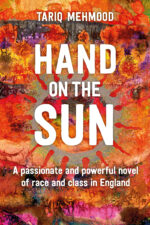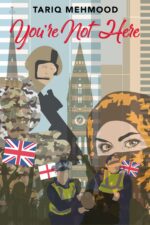Tariq Mehmood is an award winning novelist and documentary film-maker. His first novel, Hand On the Sun (London: Penguin Books, 1983), dealt with the experience of the resistance to racism by young migrant to the UK of the 1970s and 1980s. His second novel, While There is Light (Manchester: Carcanet, 2003), was set against the backdrop of the case of the ‘Bradford 12’, where 12 young men who defended their community were charged with conspiracy offences. His young adult novel, You’re Not Proper, a story of two girls struggling in a town seething with Islamophobia (London: Hope Road, 2015), won the Francis Lincoln Diverse Voices Children’s Book Award. He is the co-director of the multiple award-winning documentary Injustice, a story about people who have died in British police custody. He is also co-director of other documentaries including Defeat of the Champions and Who Polices the Police. Tariq teaches at the American University of Beirut (AUB), Lebanon. He blogs at: https://tmehmood.wordpress.com
Reviews and articles
http://www.theguardian.com/childrens-books-site/2015/sep/22/muslim-teenage-identity-tariq-mehmood?CMP=share_btn_tw
http://www.huffingtonpost.co.uk/dr-claire-chambers/book-review-tariq-mehmood_b_6978978.html
Review
http://www.middle-east-online.com/english/?id=72495
Dunia Magazine INTERVIEW: http://www.duniamagazine.com/2015/02/award-winning-writer-film-maker-tariq-mehmood-talks-race-religion-new-book-youre-not-proper/
Hand On the Sun, Penguin, London, 1983 – out of print
While There Is light, Comma, Manchester, 2003 – out of print
https://www.theguardian.com/books/2003/dec/27/featuresreviews.guardianreview10
Courageous Ali and the Heartless King, Satchel, 2006.
Major film – Injustice – story of the families of those killed in British Police custody.
http://www.theguardian.com/film/movie/88286/injustice
Homepage of Injustice Film http://www.injusticefilm.co.uk
-
Afro-Asian Poetry that Changed the World

“It is unclear when ‘Lotus’, a literary magazine of progressive Afro-Asian writers largely funded by the USSR, published its last issue after a successful run spanning two decades (1968-1991); but it was certainly a voice of the Palestinian people.
Professor Tariq Mehmood Ali teaches English at the American University of Beirut and is an award-winning novelist and a documentary filmmaker. A few years ago, he launched a project to restore the magazine’s legacy. The project involves curating, saving, preserving, and digitizing old issues, offering historical depth to the Palestine movement and potentially making the magazine accessible to a new generation of readers from Palestine and the rest of the Global South.
“‘Lotus’ resolutely opposed Zionism, seeing it as a racist tool of imperialism,” says Prof Ali, who has pored over innumerable issues of the magazine. He suggests that Palestinians would not have had such a raw deal if the publication was still in circulation.
‘Lotus’ championed the cause of the Palestinian Liberation Operation (PLO) and even passed a resolution on Palestine at its third Afro-Asian conference held in Beirut (1970-71). These and other details find mention in Prof Ali’s book ‘Afro-Asian Poetry that Changed the World’, scheduled for a spring 2024 release.
‘Lotus’ was a trilingual quarterly magazine published in Arabic, English and French – and then translated into numerous languages of formerly colonized countries.
“The writers of ‘Lotus’ as well as the journal itself had a huge cultural impact at the time, affecting tens of millions of people. This was the first time writers of Africa and Asia were able to talk to each other, across their vast continents, outside the prism of their colonial and imperial usurpers,” says Prof Ali, who is currently busy digitizing and archiving the magazine. …
Some of the prominent writers who contributed to ‘Lotus’ included Youssef El Sebai, Abdel Aziz Sadek, Edward El Kharrat (Egypt), Mouloud Mammeri (Algeria), Mulk Raj Anand (India), Hiroshi Noma, (Japan), Dr Soheil Idriss (Lebanon), Sononym Udval (Mongolia), Faiz Ahmed Faiz (Pakistan), Mario De Andrade (Portuguese Colonies), Mohamed Soleinian (Sudan), Alex La Guma (South Africa), Anatoly Sofronov (USSR), Adonis (Lebanon) and Mahmoud Darwish (Palestine).
The magazine instituted the Lotus Prize and among its recipients were Pakistan’s Faiz Ahmed Faiz and India’s Harivansh Rai Bachchan (whose son Amitabh is a well-known actor). Translation bureaus were launched in many countries of the two continents – so that people could read each other’s works.
By Lamat Hasan, an independent journalist based in Delhi.
-
You’re Not Here
One brother goes missing in action in Afghanistan, the other falls in love with an Afghan girl in England.
Bitter divisions engulf an English town where young Muslims oppose the British army’s presence in Afghanistan, whilst white youth condemn the Muslims as traitors.
To the disgust of his white friends, 17-year-old Jake Marlesden, whose brother is missing in action in Afghanistan, is in love with Leila Khan, an Afghan. When Jake tries to find out what happened to his brother, neighbour turns against neighbour and lover against lover.
Leila joins young Muslims protesting against the returning bodies of dead British soldiers, and Jake stands with the families of the soldiers. The lovers fall apart.
But far off events, and sinister forces at home, bring the lovers together again in a journey in which they will not only discover themselves, but also heal the wounds of their families and friends.
This is the sequel to You’re Not Proper.
Set in and around Manchester, You’re Not Here is informed by Mehmood’s experience of growing up a working class Pakistani in northern England, combatting racism on the streets and being arrested. The novel explores the British Asian experience in the context of the “war on terror” and Islamophobia. “I have lived and fought against various waves of racism in Britain, but the current Islamophobic one, the new racism, is far more insidious and divisive than those which preceded it,” says Mehmood in his blog.
This novel is a sequel to You’re Not Proper, which explored, in the author’s words, “what it is to be a Muslim teenager in the west today”. While it featured two teenage women’s search for identity and belonging — one with a Pakistani father and white Christian mother, the other her Hijab-wearing school friend — Mehmood’s sequel is, interestingly, told from the point of view of a white working class British youth.
Jake’s father was in the army. His elder brother is missing in action in Afghanistan. Jake is in love with a Muslim girl. We are introduced to diverse Asian characters and to white racist friends of his brother, and to the tensions both within and between the two communities, through Jake’s eyes.
While the novel reads like a pacey thriller, the teenage love story is treated with convincing tenderness. And there is sympathy for British soldiers. One scene features physically and mentally scarred ex-soldiers discarded by the state, and Military Friends and Families Against War make an appearance.
http://socialistreview.org.uk/438/youre-not-here
The narrative is packed with authentic voices, often humorous observations and insights, The novel reads like a thriller. It reaches an action-packed and moving climax, but, unlike a thriller, we are left uneasy about what may happen next.
Helen Goodway, Red Pepper, Summer 2019



